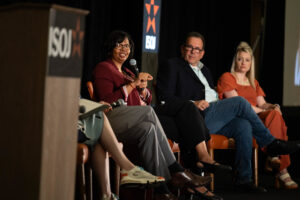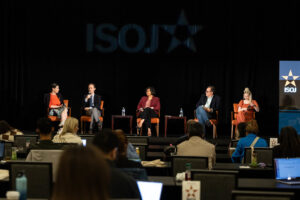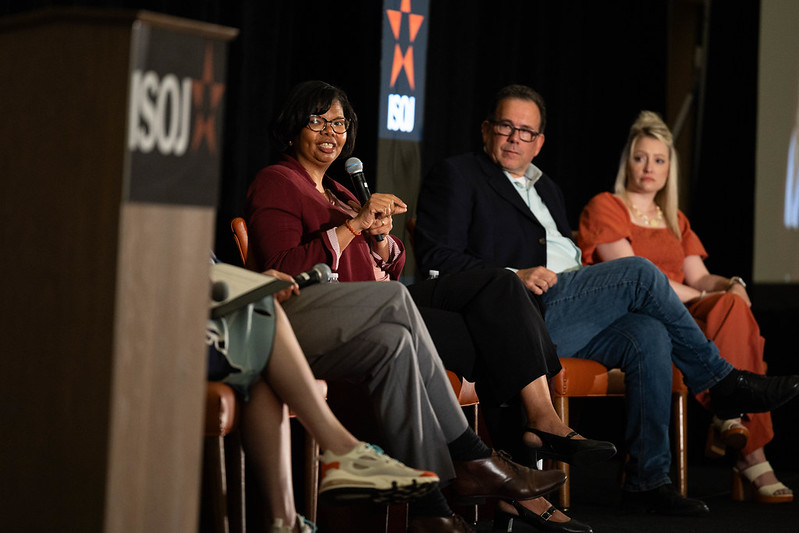April 13, 2024 | Business Models, Innovation, ISOJ2024, Local Journalism, Revenue
Press Forward, a philanthropic coalition aiming to expand funding for local journalism in the U.S., kicks off 25th ISOJ
Lee este artículo en español abajo
“In a sentence, Press Forward is a movement to get more people to pay for local news,” said John Palfrey, President of the MacArthur Foundation, as he opened the inaugural panel of the 25th International Symposium on Online Journalism (ISOJ).
“We can get off the stage. That’s the effort: To get more people thinking about this as something to support. If you want the headline: Press Forward is about more people should pay more money for news, particularly at the local level. Otherwise, we won’t have a democracy in America. More people need to pay more money for local news, so we can have a democracy. That’s it.”

Though Palfrey’s statement hinted at a conclusion, it merely set the stage. Over the next 90 minutes, Palfrey and his fellow panelists delved into the origins, operations, aspirations, and future prospects of Press Forward during the panel “Press Forward: A half-billion-dollar philanthropic initiative to revitalize U.S. local news,” held Friday morning (April 12) at the University of Texas at Austin.
The panel featured other key figures in the initiative: Press Forward Director Dale R. Anglin; Jim Brady, vice president of Journalism at the Knight Foundation; and Courtney Bengston, chief strategy officer at the Wichita Foundation. Moderating the discussion was Rachel Davis Mersey, Dean of the Moody College of Communication, UT Austin. Together, they explored various aspects of Press Forward, ranging from the origins of the initiative to its practical implementation.
Palfrey initiated the discussion by tracing the movement’s origins, announced in September with the ambitious objective of distributing $500 million in journalism grants over the next five years.
According to Palfrey, the MacArthur Foundation has upheld a longstanding commitment to supporting journalism, primarily through traditional outlets like NPR. However, following a strategic review, they decided to more than double their support for journalism, allocating an additional $150 million to local news, on top of the initial $150 million earmarked for journalism, plus a $25 million in impact investment.
Despite this amount, financing local journalism requires more funding. That’s why Palfrey spent the past 18 months “on planes, going from place to place,” until securing 57 donors for the Press Forward coalition.
While the initiative has seen success thus far, Palfrey emphasized that sustained success hinges on local funding.
“It has to be funded locally,” Palfrey emphasized. “Ultimately, the success of this is when people in communities, individuals, families, family foundations, all step up and say ‘We have to fund local news’. If it doesn’t happen, it’s not gonna work.”
The backdrop against which this initiative unfolds is worrisome: a study by Northwestern University revealed that 2.5 local American news outlets closed their doors every week in 2023. At this rate, by the end of next year, 3,000 outlets — a third of all American local newsrooms — will have closed since 2005.
Next to address the gathering was Jim Brady, from the Knight Foundation, which last September announced a $150 million donation over five years to Press Forward. Brady lauded the growing number of donors for local journalism, and underscored the necessity for this support to become habitual for the industry to thrive.
“There’s not enough money for national philanthropy to give money to every local news organization in the country, it just doesn’t scale. But if you get local funders to start taking that responsibility locally, and you get national funders to look at the bigger picture, then that’s an interesting partnership,” Brady said. “It’s a once-in-a-generation opportunity to solve this problem that’s beset us for the last 25 years.”
Press Forward Director Dale R. Anglin shed light on the initiative’s local operations. Anglin emphasized that Press Forward doesn’t seek to dictate to local media, but rather aims to empower them, taking into account local contexts.
“There are 20 chapters, and there are 20 origin stories,” Anglin said, highlighting that every case has its own features. “It really is not for national to come and then tell local how to do it. It is to galvanize and educate and get people to understand that we all have this issue in every community.”
Anglin illustrated with examples. In Florida, for instance, two individual donors collaborated with a community foundation to allocate resources. In other cases, journalists themselves took the lead.
Courtney Bengtson, chief strategy officer of the Wichita Foundation, offered a practical illustration of Press Forward’s operations. She recounted how, five years ago, their foundation’s predictive study revealed that the community of about 600,000 in Kansas lacked awareness of its challenges.
“The predictive analysis company said, ‘You can say all of these things, but your community doesn’t even know that these challenges exist, because they’re not informed about them,’” Bengtson said. “In philanthropy in general, sometimes we think ‘We can do the X, Y and Z,’ and how can we affect all those pieces. And we just took a step back as an organization and said, ‘People need to know what’s going on. If they don’t know what’s happening, they can’t affect this change.’”
This made the foundation where she works to start focusing on “news and information.” Bengtson said that, after five years of focusing on supporting journalism, now her organization is part of a network.
“I feel like we lived on a lonely island for a while, and I don’t feel that way anymore. I feel like we now have a kind of network of communities coming together to really say, ‘Hey, local news and information are as important in your community as all the other social and cultural services you have. We want people to be able to make informed and engaged decisions about the things that affect their daily lives.’”
National call
The discussion concluded with an announcement: on April 30, Press Forward will issue its first national call for proposals to support local journalism projects in the United States.

The remainder of the panel featured discussions on mobilizing local donors. About this, speakers suggested emphasizing messages that resonate with the interests of donors and that demonstrate the relevance of quality information to any other field.
The panel also discussed the initiative’s medium-term aspirations. On this front, speakers shared a common vision: in five years, they hope to see a more robust economic ecosystem for journalism, with donations to journalism becoming a commonplace occurrence.
“[Success means] making funding local journalism a habit locally. It just becomes a thing that people fund, and it’s not something that they do as a one or two year special effort. They actually say, ‘This is something I care about, and I care about it in the long term’. If we can make a lot of these community foundations that are joining press forward stick with it into the long term, that’s a huge success,” Brady said.
ISOJ is a global online journalism conference organized by the Knight Center for Journalism in the Americas at the University of Texas at Austin. In 2024, it is celebrating 25 years of bringing together journalists, media executives and scholars to discuss the impact of the digital revolution on journalism.
Press Forward, una coalición filantrópica cuyo objetivo es ampliar la financiación del periodismo local en EE.UU., primer panel del 25º ISOJ
“En una frase, Press Forward es un movimiento para conseguir que más gente pague por las noticias locales”, dijo John Palfrey, Presidente de la Fundación MacArthur, al abrir el panel inaugural del 25º Simposio Internacional de Periodismo Online (ISOJ).
“Podemos bajar del escenario. Ese es el esfuerzo: Conseguir que más gente piense en esto como algo que hay que apoyar. Si quieres el titular: Press Forward se trata de que más gente pague más dinero por las noticias, sobre todo a nivel local. Si no, no tendremos democracia en América. Más gente debe pagar más dinero por las noticias locales, para que podamos tener una democracia. Es eso”.
Aunque la declaración de Palfrey parecía una conclusión, no hizo más que preparar el terreno. Durante los 90 minutos siguientes, Palfrey y sus compañeros profundizaron en los orígenes, operaciones, aspiraciones y perspectivas de futuro de Press Forward en el panel “Press Forward: Una iniciativa filantrópica de 500 millones de dólares para revitalizar las noticias locales de Estados Unidos”, celebrado el viernes 12 de abril por la mañana en la Universidad de Texas en Austin.

En la mesa redonda participaron otras figuras clave de la iniciativa: Dale R. Anglin, Director de Press Forward; Jim Brady, Vicepresidente de Periodismo de la Fundación Knight; y Courtney Bengston, Directora de Estrategia de la Fundación Wichita. Moderó el debate Rachel Davis Mersey, Decana de la Facultad de Comunicación Moody de la Universidad de Texas en Austin. Juntos analizaron diversos aspectos de Press Forward, desde los orígenes de la iniciativa hasta su aplicación práctica.
Palfrey inició el debate recordando los orígenes del movimiento, anunciado en septiembre con el ambicioso objetivo de distribuir 500 millones de dólares en subvenciones al periodismo durante los próximos cinco años.
Según Palfrey, la Fundación MacArthur ha mantenido durante mucho tiempo su compromiso de apoyar el periodismo, principalmente a través de medios tradicionales como NPR. Sin embargo, tras una revisión estratégica, decidieron duplicar con creces su apoyo al periodismo, asignando 150 millones de dólares adicionales a noticias locales, además de los 150 millones iniciales destinados al periodismo, más 25 millones en inversiones de impacto.
A pesar de esta cantidad, la financiación del periodismo local requiere más fondos. Por eso Palfrey pasó los últimos 18 meses “en aviones, yendo de un lugar a otro”, hasta conseguir 57 donantes para la coalición Press Forward.
Aunque la iniciativa ha tenido éxito hasta ahora, Palfrey insistió en que el éxito sostenido depende de la financiación local.
“Tiene que financiarse localmente”, subrayó Palfrey. “En última instancia, el éxito dependerá de que la gente de las comunidades, los individuos, las familias, las fundaciones familiares, den un paso al frente y digan: ‘Tenemos que financiar las noticias locales’. Si no ocurre, no funcionará”.
El telón de fondo en el que se desarrolla esta iniciativa es preocupante: un estudio de la Universidad Northwestern reveló que 2,5 medios locales estadounidenses cerraron sus puertas cada semana en 2023. A este ritmo, a finales del año que viene, 3.000 medios -un tercio de todas las redacciones locales estadounidenses- habrán cerrado desde 2005.
El siguiente en dirigirse a los asistentes fue Jim Brady, de la Fundación Knight, que el pasado septiembre anunció una donación de 150 millones de dólares en cinco años a Press Forward. Brady alabó el creciente número de donantes para el periodismo local y subrayó la necesidad de que este apoyo se convierta en habitual para que el sector prospere.
“No hay dinero suficiente para que la filantropía nacional dé dinero a todas las organizaciones locales de noticias del país. Pero si se consigue que los financiadores locales empiecen a asumir esa responsabilidad a nivel local, y se consigue que los financiadores nacionales tengan una visión más amplia, se crea una unión interesante”, afirma Brady. “Es una oportunidad única para resolver este problema que nos ha acosado durante los últimos 25 años”.
El director de Press Forward, Dale R. Anglin, arrojó luz sobre las operaciones locales de la iniciativa. Anglin subrayó que Press Forward no pretende dictar a los medios de comunicación locales, sino que aspira a capacitarlos, teniendo en cuenta los contextos locales.
“Hay 20 capítulos, y hay 20 historias de origen”, dijo Anglin, destacando que cada caso tiene sus propias características. “En realidad, no se trata de que lo nacional venga y luego diga a lo local cómo hacerlo. Se trata de galvanizar y educar y hacer que la gente entienda que todos tenemos este problema en cada comunidad”.
Anglin lo ilustró con ejemplos. En Florida, por ejemplo, dos donantes particulares colaboraron con una fundación comunitaria para asignar recursos. En otros casos, los propios periodistas tomaron la iniciativa.
Courtney Bengtson, directora de estrategia de la Fundación Wichita, ofreció una ilustración práctica de las operaciones de Press Forward. Contó cómo, hace cinco años, el estudio predictivo de su fundación reveló que la comunidad de unos 600.000 habitantes de Kansas carecía de información sobre los desafíos que enfrentaba.
“La empresa de análisis predictivo dijo: ‘Puedes decir todas estas cosas, pero tu comunidad ni siquiera sabe que existen estos retos, porque no está informada sobre ellos”, explicó Bengtson. “En la filantropía en general, a veces pensamos: ‘Podemos hacer X, Y y Z’, y cómo podemos afectar a todas esas piezas. Y nosotros, como organización, dimos un paso atrás y dijimos: ‘La gente tiene que saber lo que está pasando. Si no saben lo que está pasando, no pueden influir en este cambio'”.
Esto hizo que la fundación donde trabaja empezara a centrarse en “noticias e información”. Bengtson afirma que, tras cinco años centrándose en apoyar el periodismo, ahora su organización forma parte de una red.
“Siento que durante un tiempo vivimos en una isla solitaria, y ya no lo siento así. Siento que ahora tenemos una especie de red de comunidades que se unen para decir realmente: ‘Oye, las noticias y la información locales son tan importantes en tu comunidad como todos los demás servicios sociales y culturales que tienes. Queremos que la gente pueda tomar decisiones informadas y comprometidas sobre las cosas que afectan a su vida cotidiana'”.
Llamamiento nacional
El debate concluyó con un anuncio: el 30 de abril, Press Forward publicará su primera convocatoria nacional de propuestas para apoyar proyectos de periodismo local en Estados Unidos.
El resto del debate se centró en la movilización de los donantes locales. A este respecto, los ponentes sugirieron hacer hincapié en mensajes que resuenen con los intereses de los donantes y que demuestren la relevancia de la información de calidad para cualquier otro ámbito.
El panel también debatió las aspiraciones a medio plazo de la iniciativa. En este frente, los ponentes compartieron una visión común: en cinco años, esperan ver un ecosistema económico más sólido para el periodismo, en el que las donaciones al periodismo se conviertan en algo habitual.
“[El éxito significa] hacer que la financiación del periodismo local se convierta en un hábito. Se convierta en algo que la gente financia, y no en algo que hagan como un esfuerzo especial de uno o dos años. Que de verdad digan: ‘Esto es algo que me importa, y me importa a largo plazo’. Si conseguimos que muchas de estas fundaciones comunitarias que se están uniendo a la iniciativa sigan con ella a largo plazo, será un gran éxito”, afirmó Brady.
ISOJ es una conferencia mundial de periodismo online organizada por el Centro Knight para el Periodismo en las Américas de la Universidad de Texas en Austin. En 2024, celebra 25 años reuniendo a periodistas, ejecutivos de medios y académicos para debatir sobre el impacto de la revolución digital en el periodismo.

